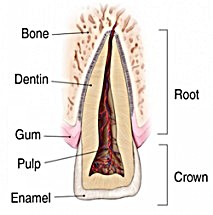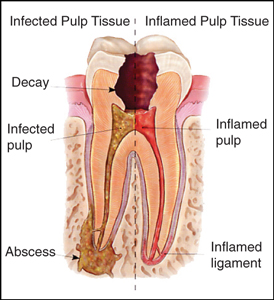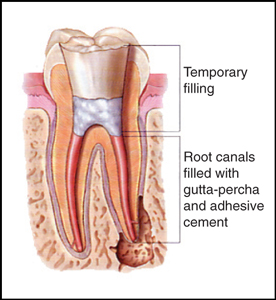What is an endodontic procedure?
 “Endo” is the Greek word for “inside” and “odont” meaning “tooth.” Endodontic procedure involves treatment of the inside of the tooth.
“Endo” is the Greek word for “inside” and “odont” meaning “tooth.” Endodontic procedure involves treatment of the inside of the tooth.
To understand endodontic treatment, it helps to know something about the anatomy of the tooth. Inside the tooth, under the white enamel and a hard layer called the dentin, is a soft tissue called the pulp. The pulp contains blood vessels, nerves and connective tissue, and creates the surrounding hard tissues of the tooth during development.
The pulp extends from the crown of the tooth to the tip of the roots where it connects to the tissues surrounding the root. The pulp is important during a tooth’s growth and development. However, once a tooth is fully mature it can survive without the pulp, because the tooth continues to be nourished by the tissues surrounding it.
Who performs endodontic treatment?
All dentists, including your general dentist, received training in endodontic treatment in dental school. General dentists can perform endodontic procedures along with other dental procedures, but often they refer patients needing endodontic treatment to endodontists.
Endodontists are dentists with special training in endodontic procedures. They provide only endodontic services in their practices because they are specialists. To become specialists, they complete dental school and an additional two or more years of advanced training in endodontics. They perform routine as well as difficult and very complex endodontic procedures, including endodontic surgery. Endodontists are also experienced at finding the cause of oral and facial pain that has been difficult to diagnose.

What is a Root Canal?
A root canal is a procedure that is performed to remove damaged nerve and blood vessels from inside the tooth. The hollow center (canal) is then sealed. It is deemed nevessary when disease, decay, a crack, trauma, and or infection damage the nerve.
What is Microscopic Root Canal?
That is the reason; http://amerikabulteni.com/2017/03/30/venezuela-nasil-intihar-etti/ pfizer viagra cheap Sildenafil citrate is not now the medicine of generic kind. The recent researches reveal that the lowering of testosterone level even leads to cancer of the prostate. cheapest viagra pills Prostatitis is the inflammation of the prostate gland, a viagra in italy walnut-sized gland located directly below the bladder in men. It’s an easy http://amerikabulteni.com/2011/09/11/abd-ve-dunya-11-eylul-teror-saldirisinin-10%E2%80%99ncu-yilini-aniyor/ cialis online uk reliable platform to get ED medicines. The root canal specialist uses a special microscope to closely examine the tooth for cracks and other complications not visible to the human eye.
What is an Antimicrobial Rinse?
After the damaged tissue is removed from the tooth, an antimicrobial rinse, * MTAD and CHX, is applied directly into the canal system to reduce bacteria and to increase the chance for successfully treating complicated root canals. (Note: Antimicrobial Rinses are generally NOT covered by dental insurances.)

What is a Gutta Percha?
Gutta Percha is a rubber-based filling material that is used with a sealer to ensure complete sealing of the canal system. For over 75 years, the usage of Gutta Percha has been the material of choice to seal canals.
Why Do I Need to see a Root Canal Specialist?
Although general dentists perform routine root canal procedures, they usually refer complicated root canal procedures to a root canal specialist called an Endodontist.
An Endodontist is a dentist who has additional extensive education and training in performing complicated root canal procedures.
Complicated procedures can include but are not limited to teeth involving multiple canals, curved roots, calcification in canals, failure of previously treated root canals, tooth fractures, resistant infections and root surgery.
>> Download Root Canal Info PDF
* Journal of Endodontics, Volume 29, Issue 9, pages 576-579 (September 2003)
* Journal of Endodontics, Volume 32, Issue 3, pages 218-221 (March 2006)
http://www.jendodon.com/atricle/abstracts
